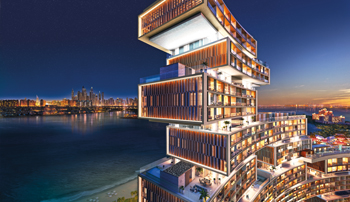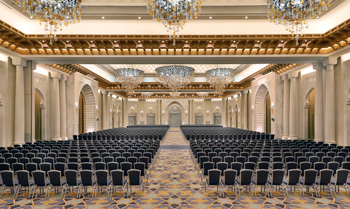
The $1.4-billion Royal Atlantis Resort and Residences ... offering homes in what is set to become Dubai’s first super-prime development.
Rooms galore!
With close to 100,000 rooms being added to its hotels portfolio, the region is gearing up to cater to an influx of tourists both to the world-class events it is set to host and its growing attractions.
01 November 2017
The GCC states are pushing ahead with their tourism ambitions in a bid to diversify their oil-based economies and are making significant investment in this sector, particularly in creating new world-class infrastructure and entertainment facilities that will draw travellers from across the world.
According to a World Travel & Tourism Council (WTTC) report, the Middle East is expected to register a 7.2 per cent increase in investment in travel and tourism-related projects this year – positioning it as the region that is seeing the largest growth globally in spending on this sector.
That is not all, the WTTC’s projections for the 2017-2027 period indicates that the region will continue to focus on this vital sector with investments growing at an average of 6.4 per cent annually.
With tourism dollars being a key source of revenue and the sector a major driver of jobs growth, the region has been making efforts to boost its travel and tourism earnings which currently account for some 4.5 per cent of its GDP.
World-class events such as the Expo 2020 Dubai and the Fifa 2022 Qatar as well as the ever-buoyant religious tourism market in Saudi Arabia are key drivers powering the upgrading of its infrastructure and the mushrooming of hotel rooms in the Gulf.
At last tally, close to 100,000 rooms are being added to the region’s hotel rooms portfolio catering to the gamut of the business and leisure travellers’ requirements. An increasing number of international chains are entering the region, and existing ones are expanding their network while home-grown brands are spreading their wings, bringing in quality and quantity.
According to STR, a key source for global data benchmarking, analytics and marketplace insights, a total of 96,694 rooms are under construction in 302 projects in the Middle East. This represents a 15.9 per cent increase in rooms being built compared with the same period in 2016, says STR’s September 2017 Pipeline Report.
The Middle East also recorded a 3.4 per cent increase in rooms under contract with 164,497 rooms in 574 hotel projects under construction for the month, the report says.
Under contract data includes projects in the in-construction, final planning and planning stages but does not include projects in the unconfirmed stage.
The report indicates that a significant number of hotels are in the uber-luxury category, with 26,363 rooms under construction and 42,606 rooms in the under-contract segment in this category.
Saudi Arabia has the highest number of rooms (40,020 rooms in 89 projects) in the in-construction stage followed by the UAE with 35,050 rooms in 121 projects.
Looking at cities specifically, STR’s report for July reveals that Dubai and Makkah have tied for the largest number of rooms under construction with a total of 23,816 rooms in 18 hotels, and they are followed by Doha (8,714 rooms in 36 projects) and Riyadh (6,712 rooms in 30 projects).
Saudi Arabia
 |
|
Hilton Makkah Convention Hotel ... the Hilton is among the largest hotel chains in Saudi Arabia. |
Another report by Tophotelprojects, however, cites Riyadh as Saudi Arabia’s busiest city for hotel construction with 48 hotel projects under way. Riyadh leads the hotel boom closely followed by Jeddah, says the 2017 Saudi Arabia Hotel Construction Overview report by Tophotelprojects.
According to the report, 170 hotels and 60,395 rooms are currently in various stages of the construction pipeline in the kingdom.
While religious tourism, followed by business travel, has traditionally accounted for the bulk of Saudi Arabia’s hotel revenues, the country has been broadening its net in line with the Saudi Vision 2030.
Among the most ambitious plans to be unveiled is the Red Sea project, announced by the Public Investment Fund in August, which will comprise a mega tourism development on more than 50 natural islands. Construction of luxury resorts as part of this development is expected to start in 2019, with Phase One to be completed by 2022.
Following the announcement of Saudi Vision 2030, international brands such as Hilton, Millennium Hotels and Resorts and Swisshotel have indicated plans to expand their footprint across the country, while new players including Rocco Forte and Nobu Hospitality are making their debut in the kingdom.
Swiss-Belhotel International (SBI) is among the latest to expand its network having just signed to manage the Swiss-Belhotel and Suites Jazan, a four-star property in the port city of Jazan owned by Cardamom International Property Management, with whom it had recently signed Swiss-Belhotel Al Aziziya Makkah.
Millennium Hotels and Resorts, Middle East and Africa is set to takeover two landmark hotels in Makkah and intends to open more than 20 hotels in the kingdom within the next four years. Following an agreement with Makkah Construction & Development Company, the group will operate Makkah Millennium Hotel and Makkah Millennium Towers, which will have direct access to the Holy Kaaba. The 614-key Makkah Millennium Hotel will undergo an extensive renovation and be converted into a luxury property that will be part of The Biltmore Collection.
Millennium Hotels & Resorts, which operates five properties in the kingdom, is also poised to open the Millennium Madinah Airport, Millennium Makkah Al Naseem and Copthorne Makkah Al Naseem.
Meanwhile, work on one of the world’s largest hotel projects, the $3.5-billion Abraj Kudai in Makkah – which was halted in 2015 following the decline in oil prices and the austerity measures announced by the government – is expected to restart and will to take at least two-and-a-half years to complete. When completed, the hotel will boast 10,000 rooms.
UAE
At least 83 new hotels are expected to open in the UAE next year, according to the latest Middle East and Africa Hotel Construction report by Tophotelprojects. This report states that the UAE currently has more than 200 hotel projects in the pipeline, with Dubai (164 projects), Abu Dhabi (25 projects) and Ras Al Khaimah (12 projects) seen as the busiest areas for hotel construction in the UAE. Of these properties, 83 will open next year.
Some of the most anticipated hotel openings include Dubai’s Rosemont Hotel and Residences, Curio Collection by Hilton (730 rooms) and Fairmont Abu Dhabi Marina Hotel & Residences (812 rooms).
BNC Network, a key provider of project research and intelligence in the Middle East and North Africa (Mena) region, indicates that a total of 543 hospitality projects worth Dh262.77 billion ($71.6 billion) are currently under way across the UAE. Of this, a total of 20 hospitality projects in Dubai worth $1.1 billion moved to construction stage during the second quarter, the BNC Network says.
The hospitality sector constitutes six per cent of all active projects in the UAE’s urban construction sector and in dollar terms these projects account for 14 per cent of the total estimated value, it adds.
As per Dubai government’s stated projections, the emirate will need to add 40,000 hotel rooms to the existing inventory of slightly more than 100,000 guest rooms and hotel apartments.
The report puts the number of active projects as at the end of Q2 in Dubai’s hospitality industry at 367, with a total estimated value of a whopping $43.7 billion.
Hotel chains
In terms of hotel chains, Hilton has the largest active pipeline in the GCC, according to data from STR, with over 21,000 rooms in its pipeline across the Gulf of which more than 16,000 are already under construction and set to open before 2020.
The six markets of the GCC contribute more than a third of Hilton’s pipeline rooms across Europe, the Middle East and Africa – where the company is active in over 60 countries.
Hilton has the largest active pipeline in the GCC, and Saudi Arabia is where the chain is undergoing the most extensive growth – with the 7,900 rooms it is developing set to nearly triple its presence in the market. Saudi Arabia, the UAE (5,000+ rooms), Kuwait (750+ rooms) and Oman (420+ rooms) all count Hilton as the hotel company with the largest number of rooms under construction.
Luxury Villas
Meanwhile, in the villas sector, the trend at the luxury end of the market is towards “designer” homes with a number of the regional developers tying up with design houses such as Fendi, Bugatti and Just Cavalli. Damac is among the frontrunners in the field, and reports “overwhelming response” to its latest launch, the Phase One of Just Cavalli villas at its golf development Akoya Oxygen in Dubai, UAE (see Real Estate).
Hotel chains too are enhancing the choice of designer homes available. Among such stunning properties is the Alef Residences on the Palm Jumeirah, which are serviced by the W hotels, and The Royal Atlantis Resort and Residences.
- Rooms galore!
- Geberit solutions create harmony
- API aims for acoustic excellence
- Pest preventive measures are key
- Access control systems boast high flexibility
- Good drain systems imperative for industry
- Paschal helps shape luxury projects


